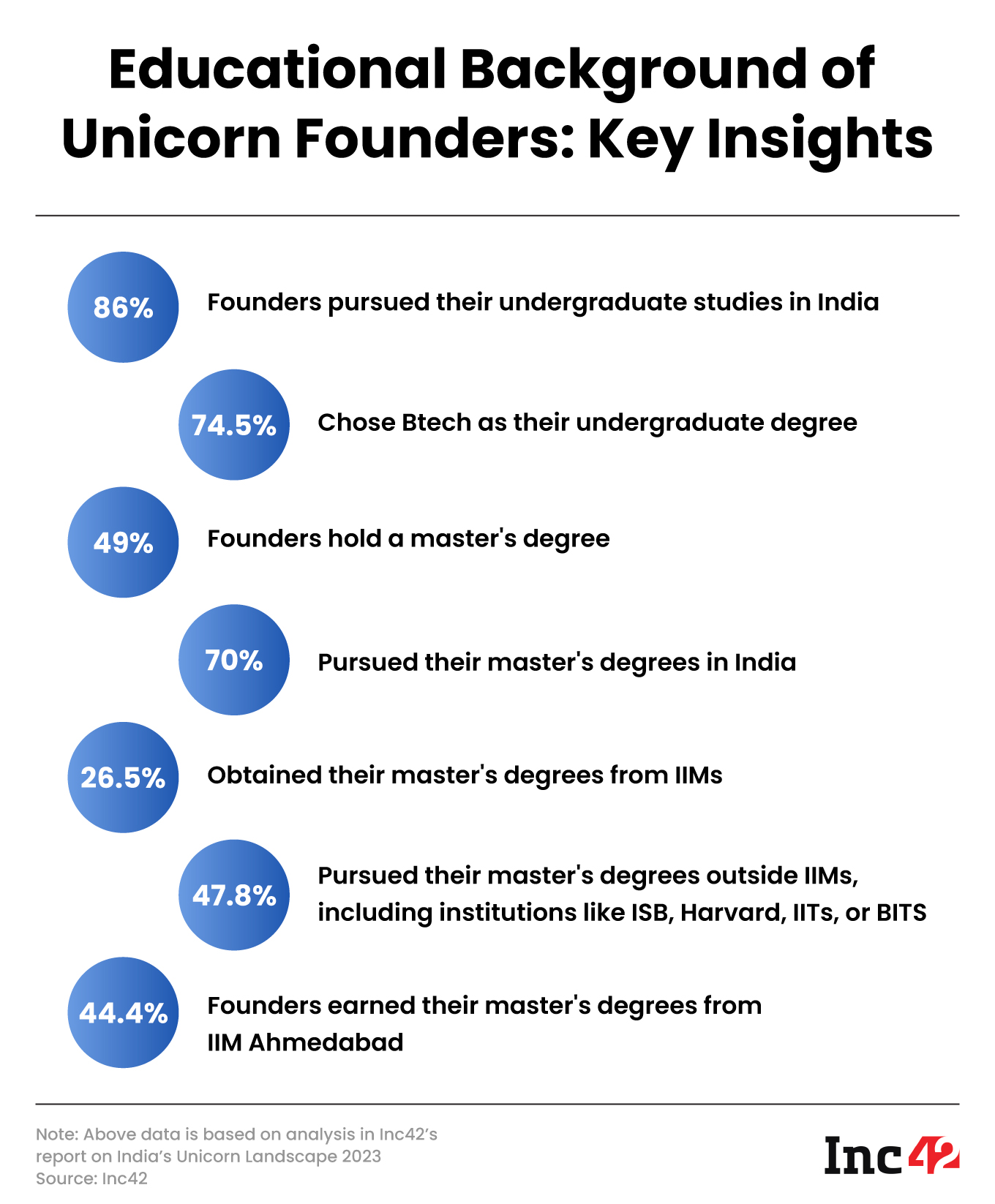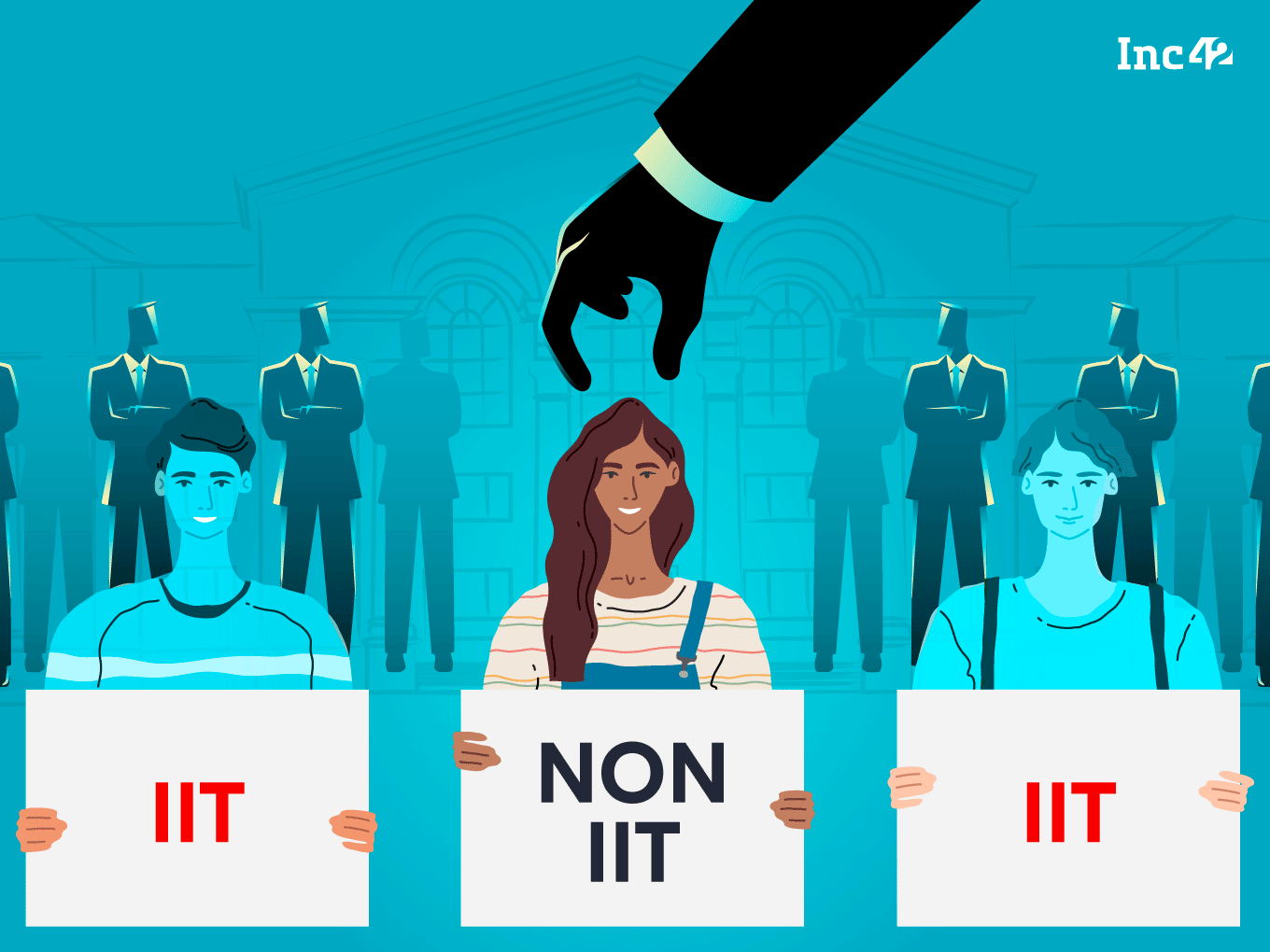Only 42% of unicorn founders are IITians, with IIT Delhi emerging as a hotbed for nurturing the highest number of founders who built billion-dollar enterprises
The emergence of unicorn founders from non-IIT and non-IIM institutions augurs well for the Indian startup ecosystem and brings forth a treasure trove of untapped talent and potential that lies beyond the confines of IITs and IIMs
Looking ahead, this trend is expected to shape the startup ecosystem, fostering inclusivity, interdisciplinary collaboration, and new prospects for aspiring entrepreneurs
The Indian startup ecosystem is experiencing an unprecedented boom. Between 2021 and 2022, India saw the birth of 67 unicorns, propelling the total count to 110.
Although the ongoing year (2023) has yet to reignite the pace of unicorn creation, projections from Inc42’s latest report, “Decoding India’s Unicorn Club Report, 2023”, indicate that by 2030, India could witness the rise of more than 280 unicorns.
Amid this, we tried to delve into the academic backgrounds of Indian founders, and we were surprised to find that over 50% of unicorn founders are not IITians, Inc42’s latest reveals based on the analysis of 278 unicorn founders.
Some of these prominent names include:
- Freshworks: A NASDAQ-listed cloud-based customer relationship management (CRM) software company established by Girish Mathrubootham, an alumnus of Shanmugha Arts, Science, Technology and Research Academy, Tamilnadu
- BYJU’S: An edtech platform launched by Byju Raveendran, who completed his bachelor’s degree in mechanical engineering from Government Engineering College, Kannur.
- Icertis: An enterprisetech platform launched by Monish Darda, who completed his bachelor’s degree in mechanical engineering from Savitribai Phule Pune University
According to the Inc42 analysis, only 42% of unicorn founders are IITians, with IIT Delhi emerging as a hotbed for nurturing the highest number of founders who built billion-dollar enterprises. IIT Bombay and IIT Kanpur follow closely as the next institutions on the list for breeding a significant number of unicorn founders.
Although this is a considerable shift from the earlier trend (when the startup ecosystem was still in its infancy) when the fundamental decision of pouring funding into any startup was determined by the founder’s academic pedigree.
As Pearl Agarwal, founder and managing director of early stage VC firm Eximius Ventures highlights, those were the times when the only data point to consider investing in the riskiest asset class such as startups was the tag of IIT and IIMs, which reflected the founder’s determination, will and grit to become successful.
However, the change that we are witnessing today reflects a shift in investors’ focus towards a broader range of skills beyond technical and managerial expertise.
As Ankur Bansal, cofounder and executive director at Blacksoil Capital highlighted, creating and running a successful business takes more than an academic pedigree. The recent trend of a higher number of startup/unicorn founders not belonging to the premier educational institutes of the nation, like IITs, showcases precisely that. Entrepreneurs from diverse backgrounds contribute unique perspectives, often inspired by their life experiences, specialised knowledge and innovative thinking — all crucial elements for startups to succeed.

Moving Beyond IITs and IIMs: Influential Factors
Moving away from an exclusive fixation on IITs and IIMs signifies a significant shift in the mindset of all key stakeholders of the startup ecosystem, including investors. Initially, the Indian startup ecosystem, exemplified by companies like Flipkart, Snapdeal, Paytm, Zomato, MobiKwik, and Ola, was dominated by entrepreneurs from the country’s most prestigious schools and colleges.
The allure of degrees from elite institutions, coupled with venture capitalists’ intense focus on founders’ educational backgrounds led to a proliferation of copied business models and concepts from the US and China.
In contrast, recent times have witnessed a growing recognition for founders from non-IIT, non-IIM, and non-engineering institutions.
Moreover, while investors initially favoured tech-savvy founders due to the tech-driven nature of startups, the evolving ecosystem acknowledged the potential value of non-engineering backgrounds as well.
Today’s startup landscape exemplifies this all-inclusive shift, with successful enterprises steered by founders boasting diverse expertise, spanning fields from medicine and business to the arts.
For instance, Hypd thrives in the creator economy space despite its founders not hailing from the IIT background. Similarly, Elda Health features a doctor as a cofounder and brands like Mamaearth underscore the importance of melding marketing and meticulous ingredient attention over sheer technology.
“Graduates from varied disciplines, including commerce, economics, MBA programmes, and those with global exposure and considerable work experience, have entered the Indian entrepreneurial landscape. They are propelled by emerging startup models such as D2C, B2B platforms, fintechs, Agri, healthtech, and the creator economy. These models have been established by non-IIT and non-engineering founders,” said Anup Jain, managing partner at Orios Venture Partners.
Other factors contributing to this shift:
- Non-IIT and non-IIM educational institutes have upped the game: The quality of education at non-IIT and non-IIM institutions has undergone significant change. Many of these institutions have invested heavily in faculty and infrastructure and are now offering world-class education.
- Maturity of the startup ecosystem: As the Indian startup ecosystem has matured, numerous successful startups founded by non-IIT/IIM graduates have demonstrated that success can be achieved even without prestigious degrees from premier institutes.
- Evolution of the investor mindset: Investors have become more open-minded, looking beyond conventional academic pedigrees. They now prioritise founders’ execution capabilities, irrespective of their educational backgrounds.
- Ex-startup employees turning entrepreneurs: With many former tech employees of startups becoming cofounders themselves, the ecosystem has compelled investors to consider experience as the basis of evolution, moving beyond solely relying on top-notch degrees.
The Future Of Entrepreneurship In India
The emergence of unicorn founders from non-IIT and non-IIM institutions augurs well for the Indian startup ecosystem. It also highlights a treasure trove of untapped talent and potential that lies beyond the confines of IITs and IIMs.
This development holds particular promise for aspiring entrepreneurs who might not have had the privilege of attending these esteemed institutions. Concurrently, this trend compels IITs and IIMs to elevate their offerings.
The evolving market landscape demands specialised insights and industry-specific expertise, attributes often possessed by non-traditional founders. This transformation underscores the growing significance of identifying distinctive market needs across diverse consumer segments and delivering fitting solutions.
Consequently, an increasing number of investors are rallying behind companies that adhere to sustainable and profitable business models, demonstrating growth potential irrespective of founders’ academic backgrounds.
Richa Bajpai, founder of the student-focussed venture firm Campus Fund, sheds light on the shifting mindset within the student community. According to her, students, who were previously inclined towards government jobs, are now embracing entrepreneurship.
It is also worth mentioning that the success stories of unicorn founders, many of whom did not emerge from elite institutions, have taken entrepreneurship as a subject of discussion at people’s dinner tables while watching shows like Shark Tank. Today’s youth draws inspiration from the achievements of these founders, with many recognising that elite institutes are not the sole breeding grounds for entrepreneurs.
“The people of this country [India] want to make a difference and create an impact, and this phenomenon is not confined to metropolitan areas or limited to IITs, IIMs, or NITs. With increasing awareness and greater accessibility to venture capital, entrepreneurship is spreading beyond the exclusive circles of elite institutes in our nation,” Bajpai added.
Looking ahead, this trend will reshape the startup ecosystem, fostering inclusivity, interdisciplinary collaboration, and new prospects for aspiring entrepreneurs. Ultimately, this shift enriches the entrepreneurial landscape, ushering in innovation and resilience for a vibrant and dynamic future.
Download The Report





